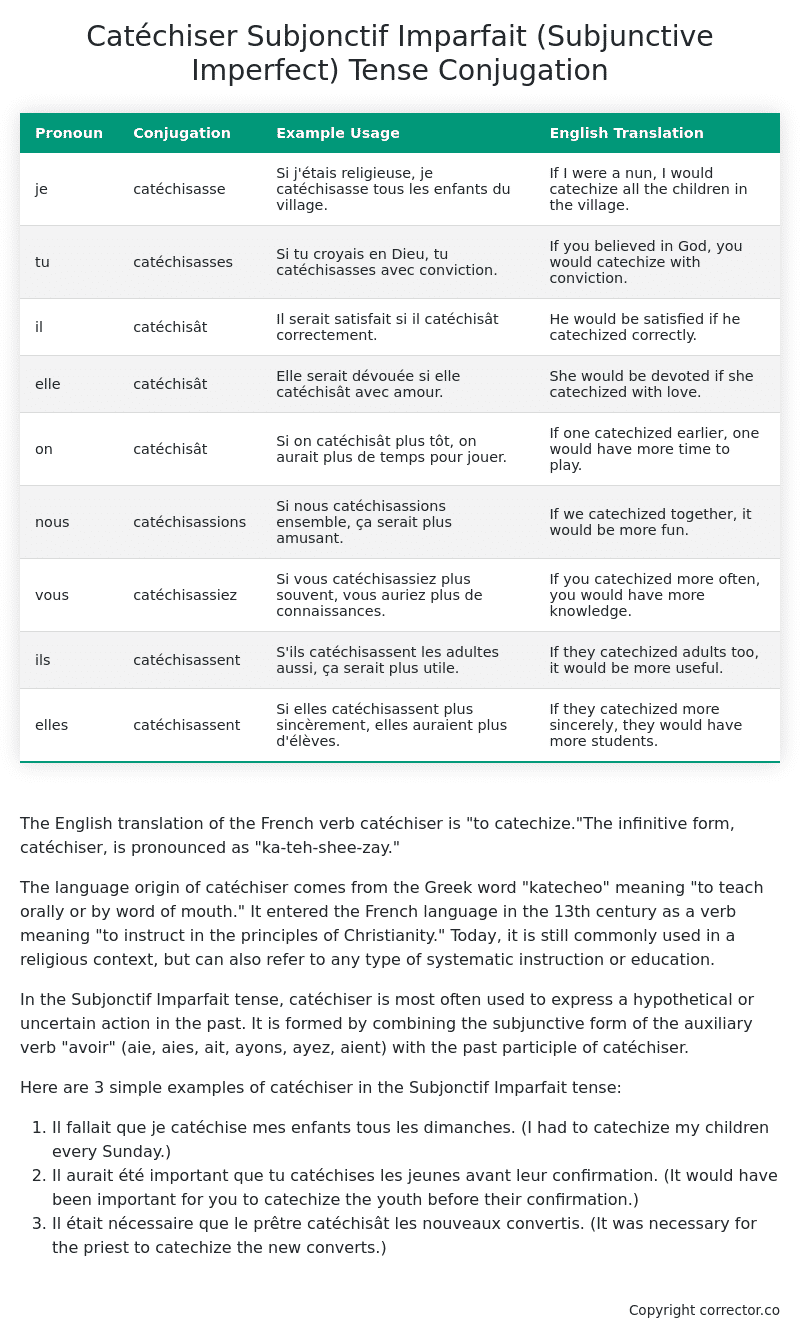Subjonctif Imparfait (Subjunctive Imperfect) Tense Conjugation of the French Verb catéchiser
Introduction to the verb catéchiser
The English translation of the French verb catéchiser is “to catechize.”The infinitive form, catéchiser, is pronounced as “ka-teh-shee-zay.”
The language origin of catéchiser comes from the Greek word “katecheo” meaning “to teach orally or by word of mouth.” It entered the French language in the 13th century as a verb meaning “to instruct in the principles of Christianity.” Today, it is still commonly used in a religious context, but can also refer to any type of systematic instruction or education.
In the Subjonctif Imparfait tense, catéchiser is most often used to express a hypothetical or uncertain action in the past. It is formed by combining the subjunctive form of the auxiliary verb “avoir” (aie, aies, ait, ayons, ayez, aient) with the past participle of catéchiser.
Here are 3 simple examples of catéchiser in the Subjonctif Imparfait tense:
- Il fallait que je catéchise mes enfants tous les dimanches. (I had to catechize my children every Sunday.)
- Il aurait été important que tu catéchises les jeunes avant leur confirmation. (It would have been important for you to catechize the youth before their confirmation.)
- Il était nécessaire que le prêtre catéchisât les nouveaux convertis. (It was necessary for the priest to catechize the new converts.)
Table of the Subjonctif Imparfait (Subjunctive Imperfect) Tense Conjugation of catéchiser
| Pronoun | Conjugation | Example Usage | English Translation |
|---|---|---|---|
| je | catéchisasse | Si j’étais religieuse, je catéchisasse tous les enfants du village. | If I were a nun, I would catechize all the children in the village. |
| tu | catéchisasses | Si tu croyais en Dieu, tu catéchisasses avec conviction. | If you believed in God, you would catechize with conviction. |
| il | catéchisât | Il serait satisfait si il catéchisât correctement. | He would be satisfied if he catechized correctly. |
| elle | catéchisât | Elle serait dévouée si elle catéchisât avec amour. | She would be devoted if she catechized with love. |
| on | catéchisât | Si on catéchisât plus tôt, on aurait plus de temps pour jouer. | If one catechized earlier, one would have more time to play. |
| nous | catéchisassions | Si nous catéchisassions ensemble, ça serait plus amusant. | If we catechized together, it would be more fun. |
| vous | catéchisassiez | Si vous catéchisassiez plus souvent, vous auriez plus de connaissances. | If you catechized more often, you would have more knowledge. |
| ils | catéchisassent | S’ils catéchisassent les adultes aussi, ça serait plus utile. | If they catechized adults too, it would be more useful. |
| elles | catéchisassent | Si elles catéchisassent plus sincèrement, elles auraient plus d’élèves. | If they catechized more sincerely, they would have more students. |
Other Conjugations for Catéchiser.
Le Present (Present Tense) Conjugation of the French Verb catéchiser
Imparfait (Imperfect) Tense Conjugation of the French Verb catéchiser
Passé Simple (Simple Past) Tense Conjugation of the French Verb catéchiser
Passé Composé (Present Perfect) Tense Conjugation of the French Verb catéchiser
Futur Simple (Simple Future) Tense Conjugation of the French Verb catéchiser
Futur Proche (Near Future) Tense Conjugation of the French Verb catéchiser
Plus-que-parfait (Pluperfect) Tense Conjugation of the French Verb catéchiser
Passé Antérieur (Past Anterior) Tense Conjugation of the French Verb catéchiser
Futur Antérieur (Future Anterior) Tense Conjugation of the French Verb catéchiser
Subjonctif Présent (Subjunctive Present) Tense Conjugation of the French Verb catéchiser
Subjonctif Passé (Subjunctive Past) Tense Conjugation of the French Verb catéchiser
Subjonctif Imparfait (Subjunctive Imperfect) Tense Conjugation of the French Verb catéchiser (this article)
Subjonctif Plus-que-parfait (Subjunctive Pluperfect) Tense Conjugation of the French Verb catéchiser
Conditionnel Présent (Conditional Present) Tense Conjugation of the French Verb catéchiser
Conditionnel Passé (Conditional Past) Tense Conjugation of the French Verb catéchiser
L’impératif Présent (Imperative Present) Tense Conjugation of the French Verb catéchiser
L’infinitif Présent (Infinitive Present) Tense Conjugation of the French Verb catéchiser
Struggling with French verbs or the language in general? Why not use our free French Grammar Checker – no registration required!
Get a FREE Download Study Sheet of this Conjugation 🔥
Simply right click the image below, click “save image” and get your free reference for the catéchiser Subjonctif Imparfait tense conjugation!

Catéchiser – About the French Subjonctif Imparfait (Subjunctive Imperfect) Tense
Formation
Common Everyday Usage Patterns
Interactions with Other Tenses
Subjonctif Présent
Indicatif Passé Composé
Conditional
Conditional Perfect
Summary
I hope you enjoyed this article on the verb catéchiser. Still in a learning mood? Check out another TOTALLY random French verb conjugation!


